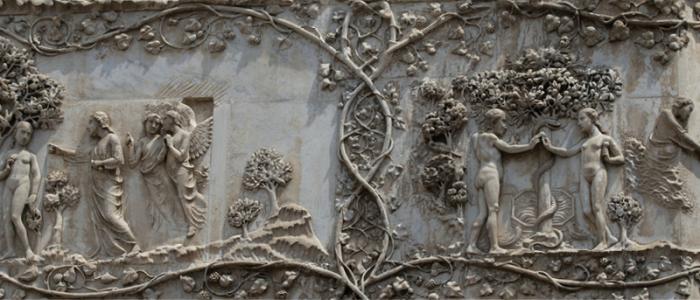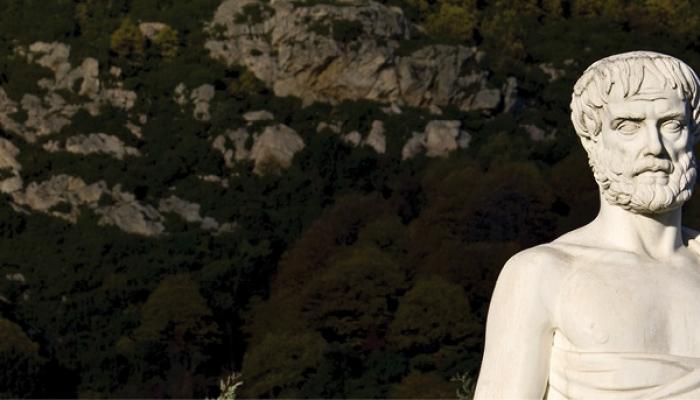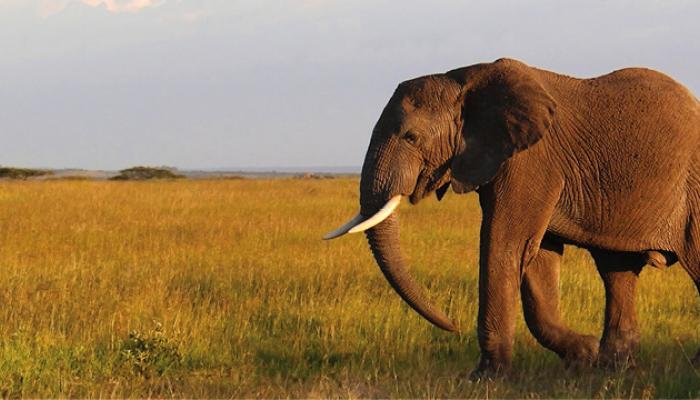
1.2 A ka ndodhur me të vërtetë historia e Adamit dhe Evës?
Historia e krijimit [>1.3] e Adamit dhe Evës nuk është një raportim i saktë [>1.20]. Sidoqoftë, na tregon shumë gjëra rreth lidhjes që njerëzit kanë me Zotin dhe njëri-tjetrin[>1.21]. Krijimi i Zotit është i mirëmenduar: ne jemi krijuar sipas një plani [>1.27]. Ai na krijoi sipas shëmbëlltyrës së vet, [>1.6] në përngjasim me të (Zan. 1:26)Zan. 1:26: Zan 1:26 Hyji tha: “Le ta bëjmë njeriun në shëmbëlltyrën e në përngjasimin tonë që të jetë zotërues i peshqve të detit, i shpendëve të qiellit, i kafshëve, i mbarë tokës, dhe i çdo zvarraniku që zvarritet mbi tokë”!.
Ndaj, zëmë një vend të veçantë në historinë e krijimit, i cili lidhet me porosinë për t’u kujdesur për të gjithë krijimin [>4.48]. Zoti na krijoi sepse na do. Të krijuar sipas shëmbëlltyrës së tij, në përngjasim me të, secili nga ne ka një dëshirë të fshehtë [>1.7] për Zotin, mu në zemër të qenies sonë. Kjo na mundëson ta duam Zotin dhe njerëzit e tjerë.
Does man have a special place in creation?
Yes. Man is the summit of creation because God created him in his image (Gen 1:27).
The creation of man is clearly distinguished from the creation of other living things. Man is a person, which means that through his understanding and will he can decide for or against love [Youcat 56].
Çfarë urdhëron Urdhërimi i shtatë?
Urdhërimi i shtatë urdhëron respektimin e të mirave të të tjerëve, nëpërmjet ushtrimit të drejtësisë dhe të bamirësisë, të vetëpërmbajtjes dhe të solidaritetit. Në veçanti, ai urdhëron mbajtjen e premtimeve të dhëna dhe të kontratave të nënshkruara; ndreqjen e padrejtësive të kryera dhe kthimin e sendeve të vjedhura; respektimin e integritetit të krijimit përmes përdorimit të kujdesshëm dhe të matur të rezervave minerare, bimore e shtazore që gjenden në tokë, duke pasur kujdes të veçantë ndaj llojeve të kërcënuara nga zhdukja. [KKKP 506].
How should we treat the environment?
We fulfil God’s commission with regard to creation when we care for the earth, with its biological laws, its variety of species, its natural beauty, and its dwindling resources, as a living space and preserve it, so that future generations also can live well on earth.
In the book of Genesis, God says, “Be fruitful and multiply, and fill the earth and subdue it; and have dominion over the fish of the sea and over the birds of the air and over every living thing that moves upon the earth” (Gen 1:28). Having “dominion over the earth” does not mean having an absolute right to dispose arbitrarily of animate and inanimate nature, animals, and plants. Because man is created in God’s image, he should care for God’s creation as a shepherd and steward. For the first book of the Bible also says, “The Lord God took the man and put him in the garden of Eden to till it and keep it” (Gen 2:15) [Youcat 436].
How should we treat animals?
Animals are our fellow creatures, which we should care for and in which we should delight, just as God delights in their existence.
Animals, too, are sentient creatures of God. It is a sin to torture them, to allow them to suffer, or to kill them uselessly. Nevertheless, man may not place love of animals above love of man. [Youcat 437]
Pse është e rëndësishme të pohojmë: “Në fillim Hyji krijoi qiellin e tokën” (Zan 1,1) ?
Sepse krijimi është themeli i të gjitha planeve hyjnore të shpëtimit; shfaq dashurinë e gjithëpushtetshme dhe të urtë të Perëndisë; është hap i parë drejt Besëlidhjes së të vetmit Hyj me popullin e Vet; është fillimi i historisë së shpëtimit që kulmon në Krishtin; është një përgjigje e parë ndaj pyetjeve themelore të njeriut rreth prejardhjes dhe qëllimit të jetës së tij. [KKKP 51].
Does science make the Creator superfluous?
No. The sentence “God created the world” is not an outmoded scientific statement. We are dealing here with a theo-logical statement, therefore a statement about the divine meaning (theos = God, logos = meaning) and origin of things.
The creation account is not a scientific model for explaining the beginning of the world. “God created the world” is a theological statement that is concerned with the relation of the world to God. God willed the world; he sustains it and will perfect it. Being created is a lasting quality in things and a fundamental truth about them. [Youcat 41]
Who created the world?
God alone, who is beyond time and space, created the world out of nothing and called all things into being. Everything that exists depends on God and continues in being only because God wills it to be.
The creation of the world is, so to speak, a “community project” of the Trinitarian God. The Father is the Creator, the Almighty. The Son is the meaning and heart of the world: "All things were created through him and for him” (Col 1:16). We find out what the world is good for only when we come to know Christ and understand that the world is heading for a destination: the truth, goodness, and beauty of the Lord. The Holy Spirit holds everything together; He is the one “that gives life” (Jn 6:63). [Youcat 44]
Why does the Book of Genesis depict creation as “the work of six days”?
The symbol of the work week, which is crowned by a day of rest (Gen 1:1—2:3), is an expression of how good, beautiful, and wisely ordered creation is.
From the symbolism of “the work of six days” we can derive important principles: (1) Nothing exists that was not called into being by the Creator. (2) Everything that exists is good in its own way. (3) Something that has become bad still has a good core. (4) Created beings and things are interrelated and interdependent. (5) Creation in its order and harmony reflects the surpassing goodness and beauty of God. (6) In creation there is an order of complexity: man is superior to an animal, an animal is superior to a plant, a plant is superior to inanimate matter. (7) Creation is heading for the great celebration when Christ will bring the world home and God will be everything to everyone. [Youcat 46]
Why did God rest on the seventh day?
God’s rest from his work points toward the completion of creation, which is beyond all human efforts.
Although man in his work is the junior partner of his Creator (Gen 2:15), he can by no means redeem the world by his toil. The goal of creation is “new heavens and a new earth” (Is 65:17) through a redemption that is given to us as a gift. Thus the Sunday rest, which is a foretaste of heavenly rest, is superior to the work that prepares us for it. [Youcat 47]
Why did God create the world?
“The world was made for the glory of God.”
(First Vatican Council)
There is no other reason for creation than love. In it God’s glory and honor appears. To praise God, therefore, does not mean applauding the Creator. After all, man is not a spectator to the work of creation. For him, “praising” God means being grateful for his own existence together with all creation. [Youcat 48]
Nëse e kuptojmë me besnikëri dhe mençuri fillimin e krijimit tonë, do të zbulojmë se njeriu u krijua në shëmbëlltyrën e Hyjit, deri në fund që të mund ta imitojë Krijuesin e tij dhe që raca jonë të mund ta arrijë dinjitetin e saj më të lartë natyror, nga forma e mirësisë Hyjnore duke u pasqyruar në ne, si në një pasqyrë. Dhe sigurisht që në këtë formë hiri i Shëlbuesit po na rikthen çdo ditë, për sa kohë që ajo që ra në Adamin e parë ngrihet në të dytin. [Shën Luanii Madh, Predikime, Nr. 12: 1 (ML 54, 168)].
Gjuha simbolike e Biblës na tregon se përpara se t'i dëbonte nga kopshti i Edenit, Hyji bëri për burrin dhe gruan veshje prej lëkure dhe i veshi ata (Krh. Zan 3:21). Kjo vepër butësie do të thotë që në pasojat e dhimbshme të mëkatit tonë, Hyji nuk dëshiron që ne të mbetemi lakuriq dhe të braktisemi në fatin tonë si mëkatarë [Papa Françesku, Audienca e Përgjithshme 16 Shtator 2015].





